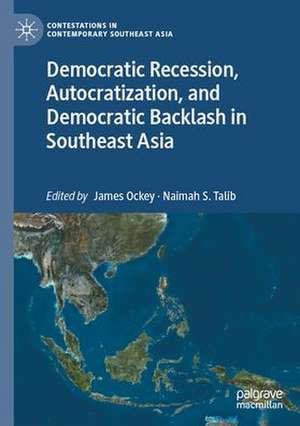Democratic Recession, Autocratization, and Democratic Backlash in Southeast Asia: Contestations in Contemporary Southeast Asia
Editat de James Ockey, Naimah S. Taliben Limba Engleză Hardback – 11 mar 2023
This book presents a new organizing framework for studying democratic recession and autocratization in Southeast Asia. By introducing a new concept, “democratic backlash,” the book details how democratic recession inevitably provokes resistance that often forms the nucleus of new democratic movements, and in doing so, argues that it is important to identify these reverse trends that may eventually become dominant.
Chapter authors are experts on Southeast Asia, a region that has experienced democratic recession and autocratization in a variety of ways, from rising populism to military coups.
Preț: 784.13 lei
Preț vechi: 956.26 lei
-18% Nou
Puncte Express: 1176
Preț estimativ în valută:
150.05€ • 155.03$ • 124.82£
150.05€ • 155.03$ • 124.82£
Carte tipărită la comandă
Livrare economică 19 martie-02 aprilie
Preluare comenzi: 021 569.72.76
Specificații
ISBN-13: 9789811998102
ISBN-10: 9811998108
Pagini: 276
Ilustrații: XVI, 276 p. 9 illus., 8 illus. in color.
Dimensiuni: 148 x 210 mm
Greutate: 0.5 kg
Ediția:2023
Editura: Springer Nature Singapore
Colecția Palgrave Macmillan
Seria Contestations in Contemporary Southeast Asia
Locul publicării:Singapore, Singapore
ISBN-10: 9811998108
Pagini: 276
Ilustrații: XVI, 276 p. 9 illus., 8 illus. in color.
Dimensiuni: 148 x 210 mm
Greutate: 0.5 kg
Ediția:2023
Editura: Springer Nature Singapore
Colecția Palgrave Macmillan
Seria Contestations in Contemporary Southeast Asia
Locul publicării:Singapore, Singapore
Cuprins
Chapter 1: Democratic Decline and Rising Autocratization in Southeast Asia: An Organizing Framework.- Chapter 2: At the Sharp Edge of Power: Philippines-China Relations and Democratic Erosion under Duterte.- Chapter 3: Anies Baswedan and Substate Populism in Jakarta, Indonesia.- Chapter 4: In Limbo: Islamist Populism and Democratic Stagnation in Malaysia.- Chapter 5: Democratic Backsliding in Malaysia: Executive Aggrandizement under Muhyiddin Yassin’s Government.- Chapter 6: Propagating and Resisting Authoritarian Innovation Online: Thailand’s ‘ROTC Cyber’ Activity. Chapter 7: Rural Grassroots Governance-Building in Myanmar.- Chapter 8: Returned Migrants and Democratization in Village Head Elections in Indonesia: A Glimpse of Hope from Indramayu.- Chapter 9: Regimes, Repression, Repertoires: Student Protest Movements and the Repertoires of Contention in the Philippines and Indonesia.- Chapter 10: Myanmar: From Hybrid Democracy to Violent Autocracy.
Notă biografică
Dr. James Ockey lectures in the Department of Political Science and International Relations, University of Canterbury, Christchurch, New Zealand. He has published widely on democratization and autocratization in Thailand. He is a co-founder and director of the Southeast Asia Research Initiative (SEARI) at the University of Canterbury.
Dr. Naimah S. Talib is an adjunct senior fellow in the Department of Political Science and International Relations, University of Canterbury. Her research focuses on democratization and the role of Islam in politics in Southeast Asia. She has done extensive research on the history and politics of Malaysia and Brunei.
Dr. Naimah S. Talib is an adjunct senior fellow in the Department of Political Science and International Relations, University of Canterbury. Her research focuses on democratization and the role of Islam in politics in Southeast Asia. She has done extensive research on the history and politics of Malaysia and Brunei.
Textul de pe ultima copertă
This book presents a new organizing framework for studying democratic recession and autocratization in Southeast Asia. By introducing a new concept, “democratic backlash,” the book details how democratic recession inevitably provokes resistance that often forms the nucleus of new democratic movements, and in doing so, argues that it is important to identify these reverse trends that may eventually become dominant.
The book contributes to current literature which thus far has sought to understand the causes and consequences of the decline in democracy around the world. Previous literature has focused primarily on advanced democracies, or alternatively, on large scale quantitative comparison. As such, this book helps fill a research gap with its focus on Southeast Asia, employing a comparative case study approach.
Chapter authors are experts on Southeast Asia, a region that has experienced democratic recession and autocratization in a variety of ways, from rising populism to military coups.
Dr. James Ockey lectures in the Department of Political Science and International Relations, University of Canterbury, Christchurch, New Zealand. He has published widely on democratization and autocratization in Thailand. He is a co-founder and director of the Southeast Asia Research Initiative (SEARI) at the University of Canterbury.
Dr. Naimah S. Talib is an adjunct senior fellow in the Department of Political Science and International Relations, University of Canterbury. Her research focuses on democratization and the role of Islam in politics in Southeast Asia. She has done extensive research on the history and politics of Malaysia and Brunei.
Dr. Naimah S. Talib is an adjunct senior fellow in the Department of Political Science and International Relations, University of Canterbury. Her research focuses on democratization and the role of Islam in politics in Southeast Asia. She has done extensive research on the history and politics of Malaysia and Brunei.
Caracteristici
Presents a new comprehensive framework for studying democratic recession and autocratization in Southeast Asia Details how democratic recession provokes resistance that often forms the nucleus of new democratic movements Contributes to current literature in seeking to understand causes and consequences of the worldwide democratic decline





